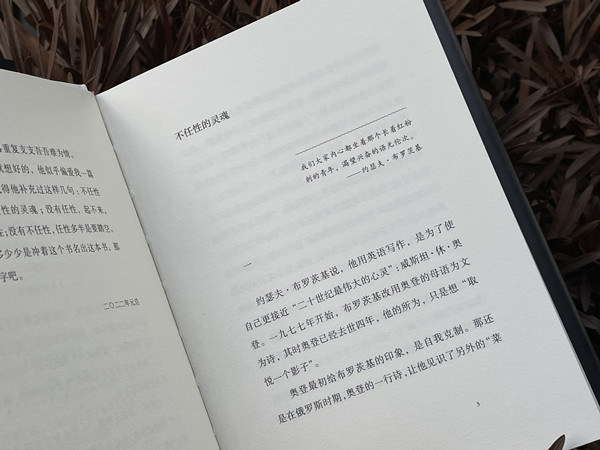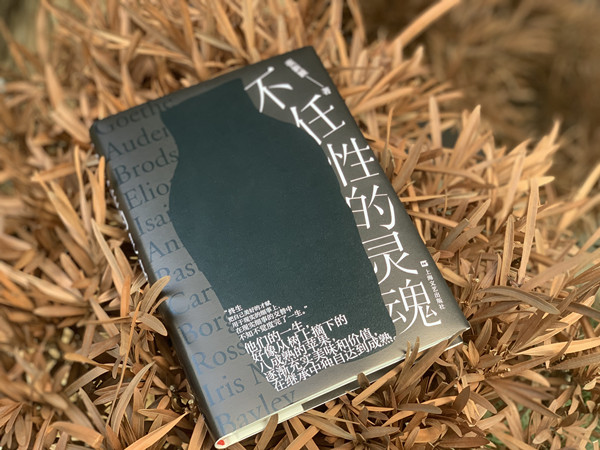Reading | The Meeting Moment of Interesting Souls – Reading Zhang Xinxin’s New Work “The Unwilling Soul”Fly into the homes of ordinary people
“The Unwilling Soul” is a collection of reading essays by Zhang Xinxin about foreign literary writers and works. Whether it is through Brodsky talking about Auden, and then talking about Goethe through Auden, or about the 100-year acceptance and influence of TS Eliot in China, or about Isaiah Berlin, Akhma Writers such as Tova, Pasternak, Borges, Raymond Carver, EB White and Alice Murdoch can undoubtedly reflect the author’s own reading interest, academic path, and poetic temperament and spiritual pursuits. In other words, in this book, these “unwilling souls” constitute a group of “soul group portraits” in a sense, and the common spiritual background behind this group of “soul group portraits” can be simply summarized as: freedom but Not capricious.
The Unwilling Soul, by Zhang Xinying, Shanghai Literature and Art Publishing House, 2022
moment of soul meeting
The entire book of Unwilling Souls can perhaps be boiled down to an interesting moment in history when souls met. For example, in the article of the same title, “The Unwilling Soul”, Brodsky meets Auden’s poems: “Auden initially gave Brodsky the impression of self-restraint.” From this, “with the help of Brodsky The understanding of Auden may be easier to understand Auden’s understanding of Goethe. Understanding is intertwined with many important factors to form a mutual relationship, including identification and projection.” In such a reading thread, Brodsky, Auden and Goethe all obtained new meaning interpretations and possibilities of understanding through the eyes of others, and behind these interpretations and understandings, they touched on such things as poetry creation. Fundamental issues such as willfulness and restraint, rebelliousness and humility, excitement and calmness.
Another example is in the article “TS Elliott and Generations of Chinese”, when Bian Zhilin, who was still a student at the time, met her teacher Ye Gongchao for the first time in class. At this moment, Bian Zhilin encountered not only Ye Gongchao, but also TS Eliot and the entire western modernist poetry tradition, which formed her own later “complication of poetry and poetry”, and gave birth to the most important poetry in China. One of the modernist poets. This seemingly ordinary teacher allocation and classroom experience actually constituted a key turning point in the history of the development of Chinese new poetry, from Xu Zhimo to Ye Gongchao, from the romantic to the modern, from Shelley to TS Eliot .
Of all these historic encounters of interesting souls, Isaiah Berlin and Akhmatova are certainly the most touching. According to the book, “He (by: Isaiah Berlin) has been asserting himself through genius, and the encounters with Virginia Woolf, Freud, Wittgenstein, Keynes are significant, They all saw his worth. But this encounter with Akhmatova was more important than any previous encounter, speaking with the “greatest” living man in his native language, here and now. Poet, it was as if he had always belonged to her circle, he knew everyone she knew, he had read every book she had read, he knew every word and meaning of her.” . Here, Zhang Xinxin did not take this encounter as those popular, pink rumors, nor did he give it too much political interpretation, but through the similarity of reading experience, the empathy and spirituality at the perceptual level. A deep understanding outlines a great moment when two interesting souls meet. Here, if the poet Liao Weitang’s wonderful poems for another group of soul encounters are “inappropriately” used, the night of Isaiah Berlin’s meeting and deep conversation with Akhmatova seems to be the same. Described as “Tonight, you’re the dance, the world is wrong”, and “Tonight, you’re spinning, I’m lost”. (Liao Weitang: “Spring of 1927, Pasternak to Tsvetaeva”)
writing as soul encounters
Talking about the encounters of interesting souls in the book, it is natural to not forget that the author Zhang Xinxin is actually encountering these interesting souls in history while writing these words. In this sense, writing itself constitutes an important form of soul encounter. Or to put it another way, writing is the process and result of the author’s entry into history and into the depths of these souls. For example, as mentioned above, looking at Auden and Goethe with the help of Brodsky, in this series of understanding chains, the author himself is actually hidden. To put it simply, this is actually Zhang Xinxin seeing a new possibility of understanding Auden in Brodsky, and re-acquainting Goethe through this understanding, so the chain of understanding, or the “unwillingness”. The “soul” sequence continues until the moment when the author writes, and the author’s writing process naturally incorporates himself into the group portrait of the soul. We can even further infer that the free and unwilling soul outlined in the article is not only the experience and choice of Goethe in the second half of his life, nor is it only the style characteristic of Auden’s poetry, but also the author’s own self-esteem. condition.

Zhang Xinxin
If such an interpretation seems a bit too cryptic, we can indeed find detailed evidence in the book of the author’s constant encounter with these interesting souls. For example, the beginning of “Writing Those Who Are Overwhelmed by Life” is the moment when the author first encounters the works of Raymond Carver: “Many years ago, I read Raymond Carver’s short story “So Much Water” , so close to home”, I was shocked and could not express myself, so I began to collect Carver’s works.” Coincidentally, in the article “Imagined Animals”, the author also recorded his first novel with Borges. Encounter: “When I was in college in the mid-to-late 1980s, I accidentally read a short story by Borges in the small reading room in the east of the school one night.
The “moments” of such “encounters” are all over the place, such as the “little paperback” of “I don’t know how many times” the author paid six dollars near the University of Chicago to buy “Little Mouse”. Another example is when the author read “Charlotte’s Web” for the first time, “he even imagined that he could change it into a martial arts novel”, and so on. As “moment”, it also means a fragmentary, momentary, and fleeting feature. When Zhang Xinxin writes these “moments”, he also captures and highlights this feature very well, that is, these encounter moments in his writings are never too descriptive or lyrical, let alone sloppy, but often Words are endless. For example, he wrote that he looked up Mu Dan’s transcripts at the University of Chicago, “I laughed when I saw the course selection that was at the top of the transcript: TSELIOT”. This act of visiting the United States and searching for Mu Dan’s transcripts obviously includes the author’s academic accumulation for many years, which leads to the corresponding concerns and awareness of historical data research. experience, etc. But the author has never written more about this, but condensed it into a sentence “I laughed”. The “laugh” here of course contains the real relief that the material search has finally yielded after untold hardships, and it also points to the unprovoked joy at the moment when the two souls meet.

Finally, back to the moment of the first “encounter” written in the whole book, that is, Li Weichang “used the letterhead of the hotel, wrote down the titles of some of my articles from memory, arranged them into a book catalogue, and sent them photos to me. I was sitting at home and was bored when I suddenly received WeChat, I was very moved, and immediately agreed to publish this book.” It turns out that the birth of the whole book also originated from the moment when the souls met this time, and it was the collision of these two free and unwilling interesting souls that presented us with more history written in the book later. Interesting souls and their wonderful encounter with each other. (Zhan Yubing)
Editor: Guo Ying
![]()
